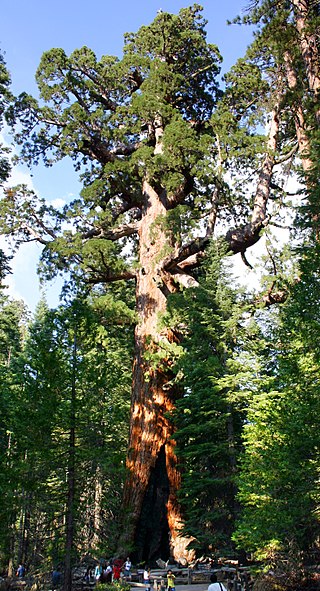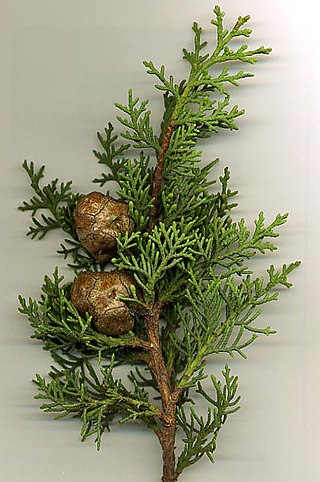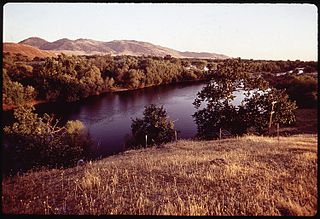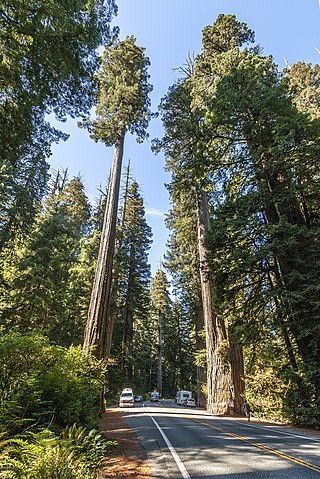Sequoia, Sequoya or Sequoyah refers to a type of tree in the cypress family which includes the redwood trees. By extension the name may refer to:

Sequoiadendron giganteum, also known as the giant sequoia, giant redwood, Sierra redwood or Wellingtonia is a coniferous tree, classified in the family Cupressaceae in the subfamily Sequoioideae. Giant sequoia specimens are the most massive trees on Earth. They are native to the groves on the western slopes of the Sierra Nevada mountain range of California but have been introduced, planted, and grown around the world.

Sequoia National Park is a national park of the United States in the southern Sierra Nevada east of Visalia, California. The park was established on September 25, 1890, and today protects 404,064 acres of forested mountainous terrain. Encompassing a vertical relief of nearly 13,000 feet (4,000 m), the park contains the highest point in the contiguous United States, Mount Whitney, at 14,505 feet (4,421 m) above sea level. The park is south of, and contiguous with, Kings Canyon National Park; both parks are administered by the National Park Service together as Sequoia and Kings Canyon National Parks. UNESCO designated the areas as Sequoia-Kings Canyon Biosphere Reserve in 1976.

Cupressaceae or the cypress family is a family of conifers. The family includes 27–30 genera, which include the junipers and redwoods, with about 130–140 species in total. They are monoecious, subdioecious or (rarely) dioecious trees and shrubs up to 116 m (381 ft) tall. The bark of mature trees is commonly orange- to red-brown and of stringy texture, often flaking or peeling in vertical strips, but smooth, scaly or hard and square-cracked in some species. The family reached its peak of diversity during the mesozoic era.

The Kings River, is a 132.9-mile (213.9 km) river draining the Sierra Nevada mountain range in central California in the United States. Its headwaters originate along the Sierra Crest in and around Kings Canyon National Park and form the eponymous Kings Canyon, one of the deepest river gorges in North America. The river is impounded in Pine Flat Lake before flowing into the San Joaquin Valley southeast of Fresno. With its upper and middle course in Fresno County, the Kings River diverges into multiple branches in Kings County, with some water flowing south to the old Tulare Lake bed and the rest flowing north to the San Joaquin River. However, most of the water is consumed for irrigation well upstream of either point.
Sequoia Capital Operations, LLC is an American venture capital firm headquartered in Menlo Park, California which specializes in seed stage, early stage, and growth stage investments in private companies across technology sectors. As of 2022, the firm had approximately US$85 billion in assets under management.

The Toyota Sequoia is a full-size SUV manufactured by Toyota mainly for the North American market since 2000 for the 2001 model year, being derived from the Tundra pickup truck. It is the second largest SUV ever produced under the Toyota brand, after the Japan-exclusive, military-focused Mega Cruiser.

Sequoia National Forest is located in the southern Sierra Nevada mountains of California. The U.S. National Forest is named for the majestic Giant Sequoia trees which populate 38 distinct groves within the boundaries of the forest.

Aricent was a global design and engineering services company. It was acquired by French-based company Altran in 2018 and renamed Altran North America in April 2019 and Altran Americas in early 2020. With Altran's acquisition by Capgemini, the successors of Aricent are incorporated into Capgemini Engineering and to a lesser extent, Capgemini Invent.

Grylloblatta is a genus of insects in the family Grylloblattidae. It contains 15 species, including Grylloblatta chirurgica, almost exclusively from high-altitude and high-latitude regions of the United States and Canada, living in ice caves and glaciers.

Sequoia sempervirens is the sole living species of the genus Sequoia in the cypress family Cupressaceae. Common names include coast redwood, coastal redwood and California redwood. It is an evergreen, long-lived, monoecious tree living 1,200–2,200 years or more. This species includes the tallest living trees on Earth, reaching up to 115.9 m (380.1 ft) in height and up to 8.9 m (29 ft) in diameter at breast height. These trees are also among the longest-living trees on Earth. Before commercial logging and clearing began by the 1850s, this massive tree occurred naturally in an estimated 810,000 ha along much of coastal California and the southwestern corner of coastal Oregon within the United States. Being the tallest tree species, with a small range and an extremely long lifespan, many redwoods are preserved in various state and national parks; many of the largest specimens have their own official names.

Sequoioideae, commonly referred to as redwoods, is a subfamily of coniferous trees within the family Cupressaceae, that range in the northern hemisphere. It includes the largest and tallest trees in the world. The trees in the subfamily are amongst the most notable trees in the world and are common ornamental trees. The subfamily reached its peak diversity in the early cenozoic.

Sequoia is a genus of redwood coniferous trees in the subfamily Sequoioideae of the family Cupressaceae. The only extant species of the genus is Sequoia sempervirens in the Northern California coastal forests ecoregion of Northern California and Southwestern Oregon in the United States. The two other genera in the subfamily Sequoioideae, Sequoiadendron and Metasequoia, are closely related to Sequoia. It includes the tallest trees, as well as the heaviest, in the world.
Pterodontia westwoodi is a species of small-headed flies.
Pterodontia notomaculata is a species of small-headed flies.
Ocnaea is a genus of small-headed flies. There are 20 described species in Ocnaea.
Ocnaea boharti is a species of small-headed flies in the family Acroceridae.
Pterodontia misella is a species of small-headed flies. It is very close in appearance to Pterodontia flavipes, and was considered a synonym of it by Curtis Williams Sabrosky in 1948. However, this synonymy has not been adopted by later authors, and P. misella is still recognised as a distinct species.
Calicina sequoia is a species of armoured harvestman in the family Phalangodidae. It is found in North America.









